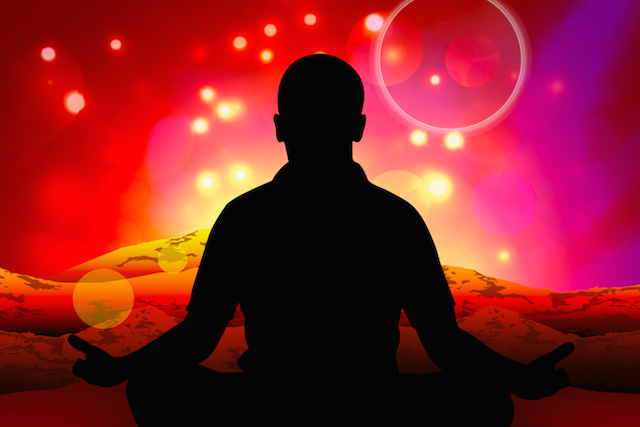
“I know, things are getting tougher when I can’t get the top off the bottom of the barrel.” ~Jesse Michaels
No one thought I was going to live to see twenty. Including me. In fact, I vividly remember telling my father that it would be miraculous if I saw twenty-five. It wasn’t emotional. It was simply a statement of fact. And yet here I am—mid-thirties, wife, daughter, one on the way, house, job, sense of purpose. What happened?
I was one of those kids with questions. Big questions. “What does it all mean?” questions. I used to wonder what the point of all of this was. As young as seven and eight I remember lying in bed at night trying to understand the nature of the world. I would examine my family, my friends, my fears, my aspirations, looking for the thread that would unravel the existential knot.
I loved to learn, and I was frequently drawn to the sciences in a way that I now see as continuing to look for answers to the big questions. When my friends were asked what they wanted to be when they grew up, they gave the common answers—policeman, fireman, professional athlete, etc. I think someone said “Batman” (it might have been me…).
When it came to me, I would usually say, “paleontologist or astronomer.” (I later amended this to astrophysicist, but I hadn’t heard of it yet, and further, didn’t have the math skills.) It was clear to me that this world had a rhyme and a reason, and I wanted desperately to understand it. And then, at twelve, I discovered the answer.
I became a drug addict and an alcoholic. It was beautiful. It did not give me any answers; it simply took away the questions. It shrunk my life to the “one-pointed mind” that I would rediscover later in another context.
Addiction is an all-consuming activity. I compounded this problem by developing a number of co-occurring mental health problems—rage, depression, anxiety. A continuous cocktail of hopelessness and loss.
This spiral was only arrested at the nick of time by the intervention of a loving family and a supportive community dedicated to service to those struggling with addiction.
In the decade and a half since, I’ve watched many friends die, go to jail, disappear, and I have often wondered what the difference between them and me is.
I have heard the “some have to die so others can live” theory and the “they just weren’t ready” platitude. I have heard the “at least they’re not struggling anymore” and the “God must have needed them” explanations. I reject these utterly.
While these statements offer some degree of emotional and psychological comfort, I can’t imagine the reality of what they seem to imply: Some of us are “chosen” and some of us are not.
I think about a friend of ours who died Christmas Eve morning from an overdose. I couldn’t conceive of going to his grief-stricken family and saying, “Bummer about your son, guess he wasn’t chosen.” I’m sure that would’ve helped lift their Christmas spirits every year.
I have been to seventeen funerals in the past few years, all for people under thirty and most under twenty-five. Each time I have asked myself the same question: Why them and not me?
I don’t pretend to have an answer. Furthermore, I don’t think there is an ANSWER (capital letters intentional). When I discovered my spiritual and meditative practice I was strongly drawn to the fact that these practices openly admitted they had no answers, only a means to investigate the questions.
Meditation doesn’t give me any answers. It doesn’t allow me to sidestep grief or pain or rage. It doesn’t make good times better or bad times suck less. It doesn’t offer me a way to disassociate from my very real human experience. Although, for the record, I have tried to use meditation to do all of these things.
So what difference does it make to me?
The meditation practices that I employ bring me face to face with the pain and hurt and fear and rage. The pain of losing my friends; the hurt that no one could help them, not even me; the fear that I very well could fall victim to the same delusions; the rage at the utter injustice of why beautiful, talented men and women at the beginning of their lives are lost to us.
In not trying to avoid the pain, I get to experience it and learn from it.
I have repeated the negative and destructive patterns of my life not because of lack of will or lack of desire to change, but merely because I didn’t see them. I’ve looked away from my pain and my trauma, and so it’s had no choice but to reemerge over and over again.
Sitting “on the cushion” has given me a stable and safe place from which to step into the sea of suffering, find the part of me that needs comfort and compassion, and try to bring it into the light.
My practice has shown me that the answers we look for are whatever we want them to be. Meaning is not an inherent quality. Things happen, and we, as human beings, assign them meaning. Sometimes the meaning is that we “live for them” (the people who have past). Sometimes we “make it matter.”
I once asked out a girl in one of my graduate school classes because I had just helped bury a seventeen-year-old kid who I realized would never get to ask a girl out again. So what the hell? I asked her, thinking maybe Danny would give me an assist from wherever he was. She still said no. I swear I could hear him laughing at me.
Sometimes we use things to reinforce the negative story that we tell ourselves about ourselves and the world we live in. We create our own victimization and tell ourselves it’s not our fault. The world is terrible. I did this forever, reinforcing the story of my own victimhood until it almost killed me.
Meditation helps me examine all of these storylines. It helps me embrace the things that make my life better and discard (almost always with assistance) the things that are detrimental to myself, that cause pain to those around me.
It offers me the opportunity to “turn the volume down” on the rage and anxiety and depression. It brings me back within the bounds of experiencing these without them becoming the monsters they used to be.
It also helps me accept reality as it is. Nothing is supposed to be happening. It’s just what is happening. Embrace it or fight it, it makes no difference. It will, has, and does happen exactly as it’s happening. I only need to adjust to conditions as they are, not how I would wish them to be, to be truly content. Meditation helps me see things closer to how they really are.
I write this having attended a funeral last week for a twenty-three-year-old man who was my student and my friend. I am selfishly grateful in a strange way that his death was accidental and not related to any substance abuse. I’m not sure if that matters, but it feels different.
I loved and will continue to love Josh. He was amazingly talented. I met him when he was fifteen and couldn’t play a note. By the end of our time together (I was a music teacher then) he could play four instruments well and a few poorly (harmonica is tough). He had interned at a local music festival during high school and eventually parlayed that into a full-time gig at one of our local venues. I am so proud of him.
His service was packed. Friends, family—he touched so many lives. The greatest gift that my practice afforded me is that I was there. Really there. I cried. I laughed. I hugged people. I snuck one of my medallions into his casket when no one was looking. I thought he’d like that, both the medallion and the sneaking. (We share a bit of an anti-authority streak.)
I didn’t run—from his death, from my feelings, or from the people around me. I hugged his dad and told him how much I adored his son and how grateful I was to have helped him along his journey. I stood with my friends and offered a shoulder when they needed it and received one when I did.
I am so deeply moved to have been able to be there, without a buffer, to help send off my friend. I can be uncomfortable and be okay with being uncomfortable. Pain and sorrow are my teachers. So are joy and love. Meditation brings me to the place where I can experience all of it. I wouldn’t trade this life for anything.
About Jake Kessler
Jake Kessler is a longtime special educator and mindfulness practitioner. He has spent his career working with social emotional learning and helping those struggling with the challenges of addiction. He has worked tirelessly to integrate his passions for mindfulness and education to enrich the lives of his students.













 Though I run this site, it is not mine. It's ours. It's not about me. It's about us. Your stories and your wisdom are just as meaningful as mine.
Though I run this site, it is not mine. It's ours. It's not about me. It's about us. Your stories and your wisdom are just as meaningful as mine. 